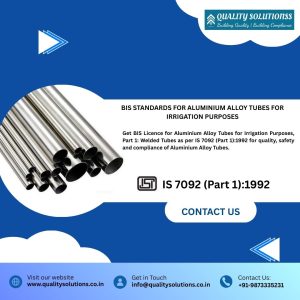BIS Standards for Aluminium Alloy Tubes for Irrigation Purposes – Understanding IS 7092 (Part 1):1992
In today’s rapidly evolving agricultural landscape, efficient irrigation systems are not just a luxury but a necessity. One of the most critical components of any modern irrigation system is the use of durable, corrosion-resistant, and high-quality pipes and tubes. Among the various materials available, aluminium alloy tubes have gained widespread acceptance due to their excellent strength-to-weight ratio, corrosion resistance, and long-term cost-effectiveness.
However, the use of aluminium alloy tubes in irrigation must comply with specific standards to ensure safety, performance, and reliability. In India, the Bureau of Indian Standards (BIS) governs the quality compliance of these tubes through IS 7092 (Part 1):1992.
In this blog, we will explore what IS 7092 (Part 1):1992 entails, its importance in the agricultural sector, and how your business can benefit by obtaining BIS Certification for Aluminium Alloy Tubes for Irrigation Purposes.
What is IS 7092 (Part 1):1992?
IS 7092 (Part 1):1992 is the Indian Standard that specifies the technical requirements for aluminium alloy welded tubes used in irrigation systems. This standard was formulated to ensure that the aluminium tubes manufactured for agricultural purposes meet a consistent level of mechanical performance, corrosion resistance, and dimensional accuracy.
Key Highlights of the Standard:
-
Part 1 of IS 7092 specifically deals with welded aluminium tubes.
-
It includes requirements for materials, manufacturing process, chemical composition, mechanical properties, and dimensional tolerances.
-
The standard ensures the tubes are suitable for long-term use in irrigation systems that are exposed to water and environmental factors.
This standard is critical for manufacturers and suppliers who aim to produce or sell irrigation-grade aluminium tubes that meet government and industry regulations.
Why BIS Certification Matters
The BIS (Bureau of Indian Standards) certification is a mark of quality assurance and regulatory compliance in India. Products that carry the ISI mark are trusted by consumers and government agencies alike. For aluminium alloy tubes used in irrigation, BIS certification provides the following benefits:
1. Regulatory Compliance
Obtaining a BIS license for aluminium alloy tubes ensures that your product meets all legal and technical requirements for sale in India. Without it, your business could face regulatory issues or product bans.
2. Market Acceptance
BIS-certified products gain greater acceptance in both public and private sector projects, especially in government-funded irrigation schemes.
3. Consumer Trust
Farmers, agricultural consultants, and irrigation contractors prefer certified products, knowing they will deliver durability, strength, and corrosion resistance.
4. Export Opportunities
Certification opens up avenues for international trade in countries that recognize BIS standards or require equivalent quality certifications.
How to Obtain BIS License for Aluminium Alloy Tubes – IS 7092 (Part 1):1992
Getting a BIS license may seem daunting, but with the right assistance, the process is smooth and manageable. Here’s a brief overview:
Step 1: Application Submission
Prepare the necessary documents, including technical details of your product, manufacturing process, testing facilities, and quality control systems.
Step 2: Product Testing
Samples are tested at a BIS-approved laboratory for compliance with IS 7092 (Part 1):1992.
Step 3: Factory Inspection
A BIS official may conduct an inspection of the manufacturing facility to verify production capabilities, testing equipment, and adherence to standards.
Step 4: Grant of License
Upon successful evaluation, the BIS license is granted, and your product can carry the ISI mark.
Role of Quality Solutions in BIS Certification
At Quality Solutions, we specialize in providing end-to-end assistance for BIS certification for aluminium alloy tubes and various other products. Our team of compliance experts helps manufacturers:
-
Understand the applicable standards
-
Prepare the documentation
-
Coordinate testing
-
Facilitate inspections
-
Liaise with BIS authorities
Our goal is to simplify the certification process, reduce delays, and help you go to market faster with a fully compliant product.
We ensure your aluminium alloy tubes for irrigation are certified according to IS 7092 (Part 1):1992, so your business stays competitive and legally compliant.
Applications of Aluminium Alloy Tubes in Irrigation
Let’s take a quick look at why aluminium alloy tubes are preferred for irrigation purposes:
1. Lightweight and Easy to Transport
Aluminium is significantly lighter than steel, making these tubes easier to handle and install, especially in remote agricultural fields.
2. Corrosion Resistance
Aluminium naturally forms an oxide layer that protects it from corrosion, especially important in water-based irrigation systems.
3. Durability
Aluminium alloy tubes offer long service life, even under harsh environmental conditions.
4. Environmentally Friendly
Aluminium is 100% recyclable, making it a sustainable choice for irrigation infrastructure.
5. Cost-Effective
Though the initial cost may be slightly higher than plastic or mild steel, aluminium’s durability and low maintenance make it cost-effective in the long run.
Conclusion
In a country where agriculture forms the backbone of the economy, the importance of efficient and reliable irrigation systems cannot be overstated. Aluminium alloy tubes, certified under IS 7092 (Part 1):1992, provide a durable and safe solution for irrigation infrastructure.
By obtaining BIS certification, manufacturers not only ensure product quality but also gain access to a broader market with enhanced trust and credibility. Whether you’re a manufacturer looking to get certified, or a project manager seeking quality assurance, partnering with a compliance expert like Quality Solutions can make all the difference.
Ready to start your BIS certification journey for Aluminium Alloy Tubes?